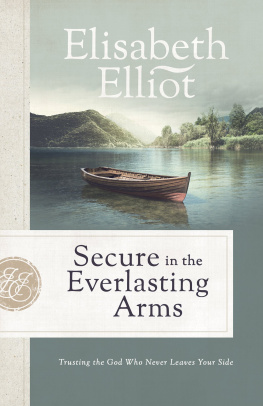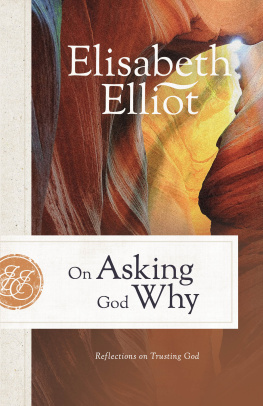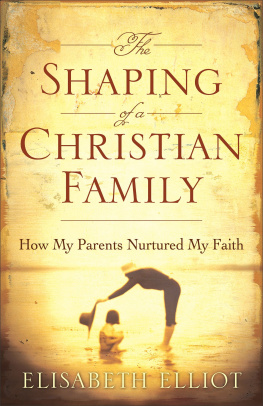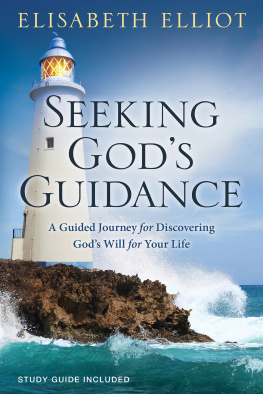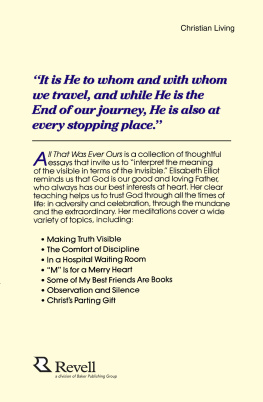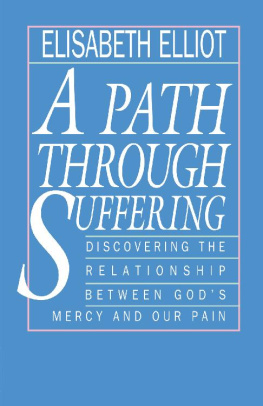Elisabeth Elliot (19262015) was one of the most perceptive and popular Christian writers of the last century. The author of more than twenty books, including Passion and Purity , The Journals of Jim Elliot , and These Strange Ashes , Elliot offered guidance and encouragement to millions of readers worldwide. For more information about Elisabeths books, please visit elisabethelliot.org.









Books by Elisabeth Elliot
A Lamp Unto My Feet
Be Still My Soul
Guided by Gods Promises
Journals of Jim Elliot
Joyful Surrender
Keep a Quiet Heart
Made for the Journey
The Mark of a Man
Passion and Purity
Quest for Love
Path of Loneliness
Path Through Suffering
On Asking God Why
Secure in the Everlasting Arms
Seeking Gods Guidance
Shaping of a Christian Family
A Chance to Die: The Life and Legacy of Amy Carmichael
Whatever My Lot
Just after the Arab-Israeli war in 1967, I spent ten weeks in Jerusalem. One afternoon I was invited to have tea with Mrs. Bertha Spafford Vester, who had lived there all of her ninety-one years. A fascinating woman, she was the fifth daughter of Horatio Spafford, who wrote the song, It Is Well with My Soul. The story of that beautiful hymn is familiar to many, but Mrs. Vester added details that were new to me.
The great Chicago fire of the 1870s caused Spafford, a wealthy businessman, to take stock of his life. Wanting to know Jesus better, he decided to sell everything and move to the land where He had walked. Shortly before the ship sailed, he was delayed by business, but took the family to New York. For some reason that he was unable to explain he had the purser change their cabin, moving them closer to the bow. He returned to Chicago to finish his business. Then came a telegram: SAVED ALONE. The ship had sunk. Mrs. Spafford had survived. Their four daughters had perished. Had they been in the cabin originally reserved amidships, all five would have drowned, for it was just there that the steamer had been struck by another vessel.
As we sipped tea and munched on Arab sweets, Mrs. Vester, who was not born until after the disaster, told me how her mother had described that terrible black night when she and her four little girls were flung into the cold sea. Frantically, she had tried to save them. Barely, she had been able to touch with her fingertips the hem of the little gown of one, but could not grasp it. She herself had been miraculously rescued as she floated unconscious on a piece of flotsam.
During Mr. Spaffords voyage to join his wife in France, the captain summoned him one day to the bridge. Pointing to his charts he explained that it was just here, where they were at that moment, that the other ship had gone down. Spafford returned to his cabin and wrote the hymn, which has comforted countless thousands.
When peace like a river attendeth my way,
When sorrows like sea-billows roll,
Whatever my lot, Thou hast taught me to say,
It is well, it is well with my soul.
That word lot is not one we often use in quite that way. It means whatever happens, that which comes by the will of the powers that rule our destiny, a share, a portion, an assignment. When we draw lots, no human power controls which will be ours.
But Christians know that we are not at the mercy of chance. A loving hand, a great wisdom, and an omnipotent power rule our destiny. The government of all is on the mighty shoulders of Christ Himself, who sees all long before it happens. All is intended for our blessing. How different things look to us! Yet think of the faith of Horatio Spafford, suffering the loss of all his children, writing, Whatever my lot, Thou hast taught me to say, It is well....
To love God is to love His will. That which He gives we receive. That which He takes we relinquish, as glad to know ourselves in the hands of God as we should be sorry to be in our own, as Fnelon said. With what astonishmentof gladness or sadnesswe receive some things! With what reluctance or delight we relinquish others! Yet we find that we can bear our own sufferings, while of others sufferings we say, That I could never bear!
Jim, whose wife has cancer, wrote to me, The assignment is so hard, but always there are the gracious giftsthe winks of heavena friend stopping by, a plumber coming at the perfect moment. Coincidences? Not to one with the eyes of faith.
God shields us from most of the things we fear, but when He chooses not to shield us, He unfailingly allots grace in the measure needed. It is for us to choose to receive or refuse it. Our joy or our misery will depend on that choice.
Shoes of Iron
Before his death Moses blessed the twelve tribes of Israel. To Asher he said, Thy shoes shall be iron and brass; and as thy days, so shall thy strength be (Deut. 33:25, KJV). How deeply the Lord set that promise into my heart on New Years Day, 1973. My second husband, Addison Leitch, was to report on January 2 to the radiologist at Massachusetts General Hospital in Boston. His worst fear had come upon him. His first wife had died of cancer, his father had died of prostate cancer. Add had been diagnosed in October not only with cancer of the prostate but also with an unrelated but virulent cancer of the lip. As we came from the doctors office on that day in 1972, he quoted Grays Elegy: The curfew tolls the knell of parting day.
New Years Day is a good time to fix ones eyes on the only One who knows what the year is to hold. What is going to happen? What shall we do? Thomas Kempis Imitation of Christ has a lovely story about a monk who was anxious about his salvation. Christ spoke to him from the Cross: If you knew that all was well, what would you today do , or stop doing ? When you have found the answer, do it, or stop doing it. One must always get back to the practical and definite.
There is something marvelously sustaining about the knowledge that Thomas Kempis and Samuel Rutherford and Amy Carmichael and Moses and the people of Israel and Mary and Joseph and countless hosts of others have suffered and feared and trusted and been carried through in the same Everlasting Arms that hold us. And so, on that New Years Day as I was imagining what that year might hold, I took that promise of shoes of iron.
We shall be given shoes of iron. We shall find the unendurable endurable, the impossible possible. The natural processes of change and decay may be unexpectedly retarded to enable us to travel where no roads are visible, no replenishing available. The Lord is the one who travels every mile of the wilderness way as our leader, cheering us, supporting and supplying and fortifying us. Not all Gods children, I suppose, have iron shoesonly the ones who need them! Lord, Thou knowest what we need.
Next page
